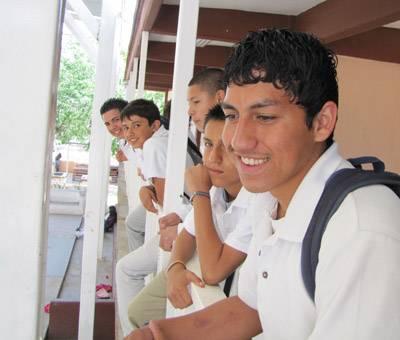Return to Mexico
Fidel Avalos (Photo: Devin Browne)
by Devin Browne
Fidel Avalos is the only 16-year-old at the 38th Secundaria School in the border city of Nogales, Mexico, who speaks with a Southern twang. “My English is better than my Spanish,” he said.
Fidel was born in Mexico but raised in Raleigh, North Carolina. He grew up listening to his mom speak Spanish, but he always answered her in English. He never learned to read or write in Spanish.
So when he started school in Mexico last fall, he was lost. “Yeah, I had problems with it. I struggle with the words, with the homework that they give me, because it’s in Spanish,” Fidel said.
This was a problem not only for Fidel. The number of children of returning Mexican migrants has gone up by nearly 25 percent in the past year in the state of Sonora, according to that state’s Department of Education.
Their families returned, in large part because of the sagging American economy and rising fears of deportation. There are now about 9,000 of these students in Sonora, with varying levels of Spanish. Many teachers don’t know what to do with them, said Sandra Hernandez, a superintendent of schools in Nogales.
“They say, what am I going to do if he doesn’t understand Spanish? Don’t be afraid, we can work with him, because there’s only one, two, three per class,” Hernandez said.
The numbers are still small, compared to the numbers of Spanish-speaking students in some U.S. states. For example, Arizona has more than 100,000 students learning English. California has more than one million. Unlike students learning English in the US, these English-speaking students in Sonora have the advantage of true immersion. They’re in homes with families who speak Spanish and in neighborhoods where everything is in Spanish, said Hernandez.
“When a kid comes from the United States, they learn Spanish so fast, believe me,” Hernandez said. But Fidel Avalos said it’s not fast enough. He said learning to write and read academic Spanish is hard, and adapting to the culture is even harder. “When I had just got here, I was so depressed,” he said. “I didn’t want to go to classes, I didn’t want to eat, I didn’t even want to talk to my mom. I just wanted to go back.”
Sonora’s Department of Education recently surveyed the new migrant students and found that many of them are unhappy. Eighty percent said they want to go back to the United States. So in March, the department piloted a new support program for them. Jesus Ramirez Cordobo, with the Education Department, said many of these students are in Mexico “against their will.” If their parents weren’t deported, he said, they often fled the U.S. out of fear that they would be.
“They were changed from one place to another without being asked. Their parents just got them, brought them over or maybe their parents were brought over without asking them. And that made them feel not very good, not very well,” Ramirez said.
Fidel is unusual. He came here voluntarily because he wanted to know more about where he was born. But he says it’s tough to fit in. He and another migrant student, Marcos Torres, said the kids here tease them about their music, their clothes, and their Justin Bieber haircuts.
“They told us to stop wearing skinny jeans,” Fidel said. “And people here tease you because they call you gringo and stuff like that!” Marcos said. “They act like we weren’t Mexicans like them,” Fidel said.
But even Fidel admits he’s not like them. He likes football and fried chicken — he’s too American. Now he just wants to go back to North Carolina, the place, he says, he’s really from. “I came here and I’ve seen what it’s like,” he said. “I just want to go back and not come back here. Ever.”
Fidel recently applied to renew his visa so that he can go back to Raleigh and live with his uncle while he finishes high school. His application is pending.
